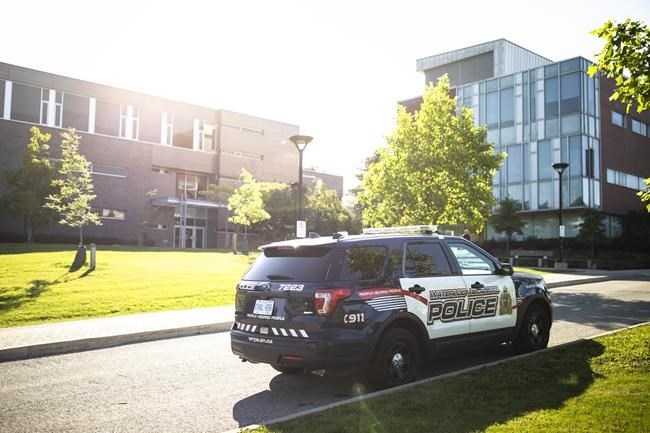TORONTO — Post-secondary institutions must ensure they remain arenas of free debate while protecting marginalized groups at the centre of polarizing discussions, an expert said, as several universities expressed a commitment to fostering learning and respect.
A professor and two students were injured this week after a stabbing during a gender issues class at the University of Waterloo. Police have called it a hate-motivated attack.
James Turk, director of the Centre for Free Expression at Toronto Metropolitan University, said the attack should prompt universities and colleges to reassess their security measures in an effort to keep their campuses places that can safely address difficult topics head on.
"Freedom to explore differences and to challenge conventional wisdom is the heart of what universities are about," he said in an interview on Friday.
"But what happened at Waterloo was horrific. One of the things that we're very clear about in Canada ... free expression does not include the right to express yourself with violence."
Geovanny Villalba-Aleman, an international student who had recently graduated, has been charged with multiple offences, including three counts of aggravated assault, in the Waterloo stabbings. Police allege the 24-year-old man was broadly targeting the LGBTQ community, and that the subject of the gender issues class was of interest to him.
A 38-year-old female professor and a male and female student from the class are recovering from non-life threatening injuries after Wednesday's attack.
Turk said that while what was seen at the University of Waterloo is rare in Canada, history has repeatedly shown that intolerance of new ideas, open discussion and debate can breed violence.
"The history of differences and extreme reactions go back thousands of years," he said. "Socrates was put to death for corrupting morals, allegedly, of students in Athens. Galileo was threatened by the Catholic church over his views that the Earth revolved around the sun and was put under house arrest."
Currently, the issue of gender identity is a polarizing one, Turk said.
"We've gone through a really major change over the last 40 years – a wonderful change – where we've come to recognize LGBTQ rights .... So there should be a special concern for faculty and students in those areas," he said.
He pointed to places around the world that are currently persecuting members of the LGBTQ community. Earlier this year, Uganda became the latest country to pass a bill making it a crime to identify as gay, with tough sentences, including the death penalty, in some cases.
In Canada, police say they have noticed an uptick in attacks against members of the LGBTQ community.
Universities Canada said Friday that post-secondary institutions condemn the violence that took place in Waterloo this week.
"Canada’s universities are places for learning, respect, tolerance and understanding; they are committed to providing a safe and respectful environment to live, learn and work," the group that represents Canada's universities wrote in a statement.
"There is no place for violence of any kind. It is deeply concerning that this hate-motivated attack targeted gender expression and gender identity, and those seeking inclusion in our communities."
University of Waterloo president Vivek Goel acknowledged that the world is "increasingly polarized" and "grappling with the acceptance of different gender expressions and identities."
"Today, we can be assured that our campuses are safe, but unfortunately, not without ever present risks," Goel said a day after the stabbings.
"It is so important that we are solid, that we uphold our values, that we love one another, and that we push for change."
Mohamed Lachemi, president of Toronto Metropolitan University, had a similar message.
"Universities must continue to confront sexism and gender-based violence vigilantly ... every day and not just in response to tragedy or a crisis," he wrote in a statement Friday.
"We must also remain steadfastly committed to creating a community for students to learn, for faculty to teach and pursue scholarly, research and creative activities, and for staff to work in a culture of respect and civility."
This report by The Canadian Press was first published June 30, 2023.
Fakiha Baig, The Canadian Press

